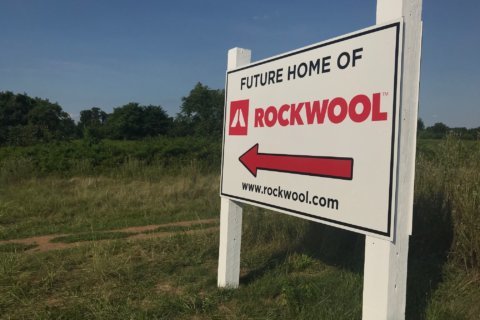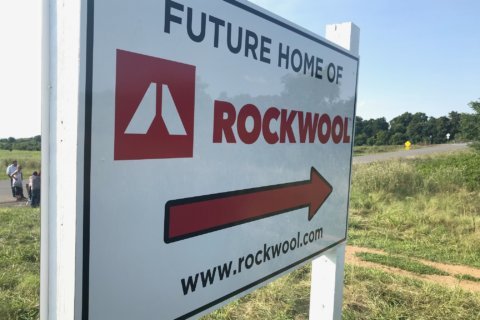WASHINGTON — As heavy machinery builds a mammoth 463,000-square-foot insulation factory on the site of a former apple orchard in Ranson, West Virginia, thousands of concerned neighbors and some local governments are trying to stop construction in its tracks.
However, the Denmark-based company, Rockwool, has publicly vowed legal action “if the local government entities renege on their promises.”
Controversy, fear and anger erupted in July, after neighbors learned a 24-hour-a-day factory is being built on the former Jefferson Orchards site near State Route 9, where rocks will be melted into molten lava in the manufacturing of stone wool insulation.
Rockwool said its plant will bring 150 jobs to the area.
Opponents of the factory have expressed fears of what will spew from the factory stacks, as well as concerns about the safety of nearby water supplies, and they have vowed to stop construction through political pressure and legal action.
In a letter to the Jefferson County Commission, obtained by WTOP, Rockwool attorney James Walls said the plant has, and will, meet all environmental and health standards, despite fears expressed by opponents.
“Those critics believe they can halt the development of Rockwool’s Ranson facility by scaring local government officials, like the Jefferson County Commission, into breaking their promises,” Walls wrote.
“Rockwool would have no alternative but to pursue its legal rights and remedies to the fullest extent should it not receive the economic tax and utility incentives it was promised and upon which it has relied and performed.”
While the plant will be built in the town of Ranson, the deal to build the factory is enmeshed in a labyrinth of tax, water and sewer agreements that include Jefferson County, the Jefferson County Development Authority, Charles Town and the West Virginia Development Office.
Nearby Harper’s Ferry has voted to oppose construction of the factory, and after concerns from the Jefferson County Board of Education, Rockwool agreed to conduct an independent human health risk investigation.
Since then, concern about emissions emanating from the plant have prompted Virginia 10th District Rep. Barbara Comstock and West Virginia 3rd District Rep. Alex Mooney to send letters to the Environmental Protection Agency, encouraging scrutiny of Rockwool.
The “impact to Loudoun County [Virginia] could cause irreparable harm to the local economy, especially the agritourism industry,” Comstock said. And Mooney wants to ensure the factory “does not contribute to increased water and air pollution.”
Loudoun County’s Board of Supervisor chair, Phyllis Randall, expressed opposition to the plant, and the board is currently researching possible actions the county could take in regard to ongoing construction in neighboring Jefferson County.
Although there have been sporadic news articles in local publications about the plant, most residents say they weren’t aware of the scope of what would happen at the new plant — many thought it would be a warehouse and distribution plant, rather than a 24-hour-a-day plant, manufacturing products carried away by up to 100 semitractor-trailers per day, according to the company.
In an August WTOP interview, Rockwool president Trent Ogilvie said the company obtained its Clean Air Permit from the West Virginia Department of Environmental Protection in April, and has met all U.S. EPA requirements.
Ogilvie has said he hoped when neighbors learn about the factory, opposition will fade. Yet, bottom line, “We will be building the factory.”
In the letter to the Jefferson County Commission, Walls ended with a not-very-veiled warning: “I urge you to consider the chilling effect it will have on future economic development in Jefferson County if the local government entities renege on their promises to Rockwool. Obviously, it will be very difficult to recruit economic investment and job-creators with that kind of precedence.”







